This article was co-authored by Lydia Shedlofsky, DO. Dr. Lydia Shedlofsky is a Resident Dermatologist who joined Affiliated Dermatology in July of 2019 after completing a traditional rotating internship at Larkin Community Hospital in Miami, Florida. She earned a Bachelor of Science in Biology at Guilford College in Greensboro, North Carolina. After graduation, she moved to Beira, Mozambique, and worked as a research assistant and intern at a free clinic. She completed a Post-Baccalaureate program and subsequently earned a Master's Degree in Medical Education and a Doctorate of Osteopathic Medicine (DO) from the Lake Erie College of Osteopathic Medicine.
wikiHow marks an article as reader-approved once it receives enough positive feedback. In this case, 90% of readers who voted found the article helpful, earning it our reader-approved status.
This article has been viewed 510,842 times.
A breast rash is the irritation and redness that usually occurs on the skin under the breasts. Breast rash may occur as a result of wearing a bra that doesn't fit well or excessive sweating below the breasts. A breast rash may present itself in the form of scaling of the skin under the breasts, blisters, itchiness and red patches. Thankfully, there are many things you can do to soothe the itchiness and get rid of the rash.
Steps
Treating a Rash At Home
-
1Apply a cold compress to the area. If you notice a rash on your breasts, try a cold compress. This can help reduce inflammation and lead to an improvement in symptoms.
- You can simply wrap ice in a cotton towel or plastic bag. You can also purchase ice packs from a local supermarket. Keep in mind store bought ice packs should not be applied directly to the skin — wrap them in a towel before applying.[1]
- Apply the ice pack for 10 minutes at a time. Then, take a break and repeat as symptoms persist.[2]
- You can also use a bag of frozen corn or peas as an ice pack.
-
2Take a warm bath or shower. A warm bath or shower can help with any skin rash, including one under the breasts. You can also run a washcloth under warm water and place it under your breast for a few minutes.[3]Advertisement
-
3Try basil. Basil is an herb that may help soothe skin for some. Crush fresh basil until they form a paste-like substance. Then spread the paste gently onto your rash and let sit until dry. Rinse the paste off with warm water and pat the area dry. Use this method once a day and see if you notice an effect.
- Once again, home remedies do not work for everyone. If you notice this worsens your rash, do not repeat this method. You should not use basil leaves if you know you have an existing allergy to basil.
-
4Apply calamine lotion, aloe vera, or a fragrance-free moisturizer to the rash to soothe irritation. Certain lotions and moisturizers might help alleviate a rash. Try using a fragrance-free moisturizer, aloe vera, or calamine lotion.
- Calamine lotion can prevent itching and irritation, especially if you believe your rash was caused by something like poison oak or ivy. Use twice a day and apply with a cotton ball.
- Aloe vera gel is a gel sold at most supermarkets and drug stores. For some, it provides relief to rashes and skin irritation. It has antifungal and antibacterial properties that can help a rash heal. Apply aloe vera gel to the affected area. You do not need to wipe it off but you should let it sit for about 20 minutes before getting dressed. Repeat as needed.[4]
- You can buy a fragrance-free moisturizer at a local drugstore or supermarket. Make sure it is unscented, as the oils and perfumes used in scented lotions can make irritation worse. Apply to the rash as needed, following any specific instructions on the bottle.[5]
-
5Use tea tree oil. For some, tea tree oil can soothe skin rashes. Tea tree oil has excellent antimicrobial properties. Keep in mind tea tree oil should never be applied directly to the skin as this can make problems worse. Always dilute tea tree oil in olive oil before use.
- Mix four tablespoons of olive oil with six drops of tea tree oil. Dip a cotton ball in the mixture and dab it gently on the affected area.[6]
- Massage the affected area lightly for a few minutes to work the oil into your skin. For best results, do this after taking a bath or shower and again before going to bed.[7]
- Some people may have sensitivities to tea tree oil. If you've never used it before, test it on a small area, like the inner part of your arm, to make sure it doesn't irritate your skin. If you notice any irritation, or if your symptoms get worse in response to tea tree oil, cease use immediately.
Seeking Medical Care
-
1Know when you should see a doctor. Most rashes under your breast are benign and caused by common skin conditions that will go away without medical treatment; however, a breast rash can occasionally be a symptom of bigger medical concerns, such as shingles. You should see a doctor under any of the following conditions.
-
2Go in for a doctor's visit. Make an appointment with your regular doctor to have the rash evaluated. Let them know if you're experiencing any other symptoms in addition to the rash.
- Your doctor will probably want to look at the rash. If it's caused by something benign and you don't have other symptoms, they may be able to diagnose you without further examination.[10]
- A skin scraping test may be ordered to check for a fungal infection. The doctor may also use a special lamp, known as a Wood's lamp, to examine the skin further. In rare cases, a skin biopsy may be needed.[11]
-
3Try medications. If the rash is caused by an infection or does not clear up on its own, your doctor may recommend medications. There are a variety of prescription meds used to treat skin rashes.
Making Lifestyle Changes
-
1Keep the underside of your breasts dry. Moisture under the breasts can lead to skin infections and rashes.[14] Work to keep the underside of your breasts dry to prevent rashes.
-
2Watch out for potential irritants. It's possible a certain product you're using may be contributing to a skin rash. If you've been using a new soap, shampoo, lotion, fabric detergent, or other product that has contact with your skin cease use. See if symptoms clear up. If they do, avoid that product in the future.[17]
-
3Wear a bra that fits you well. A bra that's too big or too small could contribute to skin irritation that causes rashes on the breast. Buy bras made out of cotton that use high-grade elastic materials. You should not buy bras made out of synthetic fabrics, as these can irritate the skin. If you're unsure of your bra size, go to your local department store and ask for a fitting.[18]
- Avoid underwires if possible, or make sure they aren't poking or irritating your skin.
-
4
Expert Q&A
Did you know you can get expert answers for this article?
Unlock expert answers by supporting wikiHow
-
QuestionWhat causes a rash under breasts?
 Lydia Shedlofsky, DODr. Lydia Shedlofsky is a Resident Dermatologist who joined Affiliated Dermatology in July of 2019 after completing a traditional rotating internship at Larkin Community Hospital in Miami, Florida. She earned a Bachelor of Science in Biology at Guilford College in Greensboro, North Carolina. After graduation, she moved to Beira, Mozambique, and worked as a research assistant and intern at a free clinic. She completed a Post-Baccalaureate program and subsequently earned a Master's Degree in Medical Education and a Doctorate of Osteopathic Medicine (DO) from the Lake Erie College of Osteopathic Medicine.
Lydia Shedlofsky, DODr. Lydia Shedlofsky is a Resident Dermatologist who joined Affiliated Dermatology in July of 2019 after completing a traditional rotating internship at Larkin Community Hospital in Miami, Florida. She earned a Bachelor of Science in Biology at Guilford College in Greensboro, North Carolina. After graduation, she moved to Beira, Mozambique, and worked as a research assistant and intern at a free clinic. She completed a Post-Baccalaureate program and subsequently earned a Master's Degree in Medical Education and a Doctorate of Osteopathic Medicine (DO) from the Lake Erie College of Osteopathic Medicine.
Dermatologist
-
QuestionCan I still go into the pool with a sweat rash?
 Chris M. Matsko, MDDr. Chris M. Matsko is a retired physician based in Pittsburgh, Pennsylvania. With over 25 years of medical research experience, Dr. Matsko was awarded the Pittsburgh Cornell University Leadership Award for Excellence. He holds a BS in Nutritional Science from Cornell University and an MD from the Temple University School of Medicine in 2007. Dr. Matsko earned a Research Writing Certification from the American Medical Writers Association (AMWA) in 2016 and a Medical Writing & Editing Certification from the University of Chicago in 2017.
Chris M. Matsko, MDDr. Chris M. Matsko is a retired physician based in Pittsburgh, Pennsylvania. With over 25 years of medical research experience, Dr. Matsko was awarded the Pittsburgh Cornell University Leadership Award for Excellence. He holds a BS in Nutritional Science from Cornell University and an MD from the Temple University School of Medicine in 2007. Dr. Matsko earned a Research Writing Certification from the American Medical Writers Association (AMWA) in 2016 and a Medical Writing & Editing Certification from the University of Chicago in 2017.
Family Medicine Physician
-
QuestionWhy do rashes occur?
 Chris M. Matsko, MDDr. Chris M. Matsko is a retired physician based in Pittsburgh, Pennsylvania. With over 25 years of medical research experience, Dr. Matsko was awarded the Pittsburgh Cornell University Leadership Award for Excellence. He holds a BS in Nutritional Science from Cornell University and an MD from the Temple University School of Medicine in 2007. Dr. Matsko earned a Research Writing Certification from the American Medical Writers Association (AMWA) in 2016 and a Medical Writing & Editing Certification from the University of Chicago in 2017.
Chris M. Matsko, MDDr. Chris M. Matsko is a retired physician based in Pittsburgh, Pennsylvania. With over 25 years of medical research experience, Dr. Matsko was awarded the Pittsburgh Cornell University Leadership Award for Excellence. He holds a BS in Nutritional Science from Cornell University and an MD from the Temple University School of Medicine in 2007. Dr. Matsko earned a Research Writing Certification from the American Medical Writers Association (AMWA) in 2016 and a Medical Writing & Editing Certification from the University of Chicago in 2017.
Family Medicine Physician
Warnings
- Breast rashes are common in women who are breastfeeding, obese, and diabetic.⧼thumbs_response⧽
- Itching the skin below the breasts may cause one to scratch and this may cause an infection.⧼thumbs_response⧽
References
- ↑ http://www.md-health.com/Rash-under-Breasts.html
- ↑ http://www.md-health.com/Rash-under-Breasts.html
- ↑ http://www.mayoclinic.org/symptoms/breast-rash/basics/when-to-see-doctor/sym-20050817
- ↑ http://www.md-health.com/Rash-under-Breasts.html
- ↑ http://www.mayoclinic.org/symptoms/breast-rash/basics/when-to-see-doctor/sym-20050817
- ↑ http://www.md-health.com/Rash-under-Breasts.html
- ↑ http://www.md-health.com/Rash-under-Breasts.html
- ↑ Lydia Shedlofsky, DO. Dermatologist. Expert Interview. 11 November 2020.
- ↑ http://www.mayoclinic.org/symptoms/breast-rash/basics/when-to-see-doctor/sym-20050817
- ↑ https://www.nlm.nih.gov/medlineplus/ency/article/003223.htm
- ↑ https://www.nlm.nih.gov/medlineplus/ency/article/003223.htm
- ↑ https://www.nlm.nih.gov/medlineplus/ency/article/003223.htm
- ↑ https://www.nlm.nih.gov/medlineplus/ency/article/003223.htm
- ↑ Lydia Shedlofsky, DO. Dermatologist. Expert Interview. 11 November 2020.
- ↑ http://www.md-health.com/Rash-under-Breasts.html
- ↑ Lydia Shedlofsky, DO. Dermatologist. Expert Interview. 11 November 2020.
- ↑ http://www.mayoclinic.org/symptoms/breast-rash/basics/when-to-see-doctor/sym-20050817
- ↑ http://www.md-health.com/Rash-under-Breasts.html
- ↑ Lydia Shedlofsky, DO. Dermatologist. Expert Interview. 11 November 2020.
- ↑ http://www.md-health.com/Rash-under-Breasts.html
About This Article
To get rid of a rash under your breasts, apply an ice pack to the area for 10 minutes at a time, which will reduce inflammation. Alternatively, try taking a warm bath or shower to soothe your skin. After you dry off, apply some calamine lotion or aloe vera gel to the area to reduce itching. If your rash doesn’t improve after a week or two, make sure to see a doctor for treatment. To learn how to make lifestyle changes that will help prevent rashes, read more from our Medical co-author!
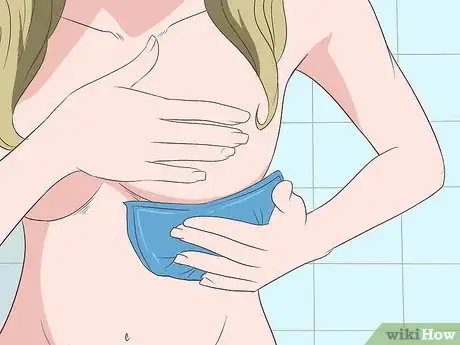
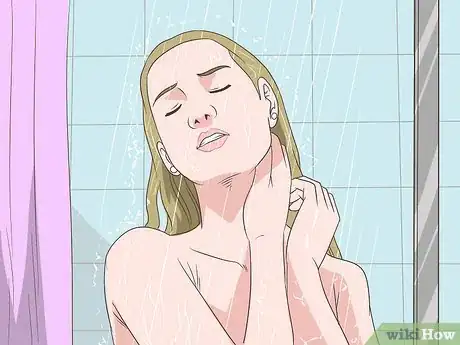
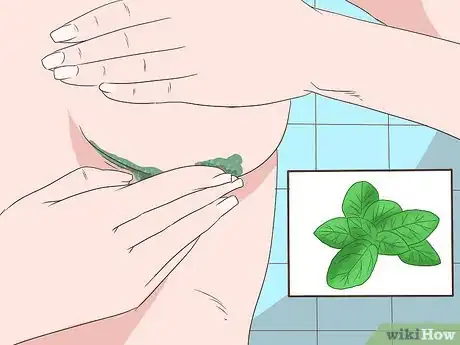
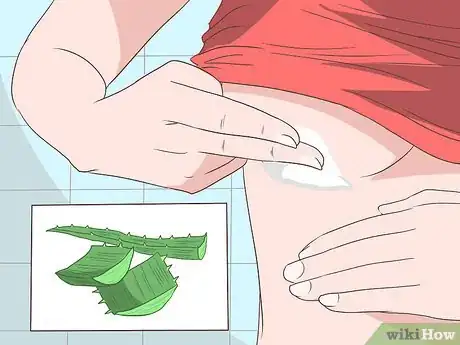
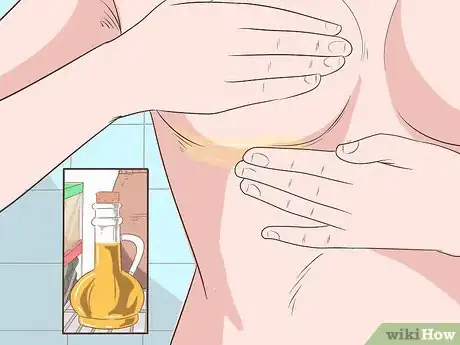
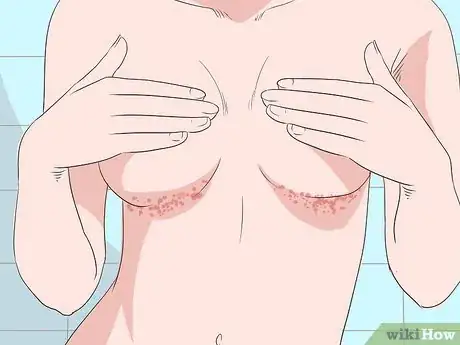

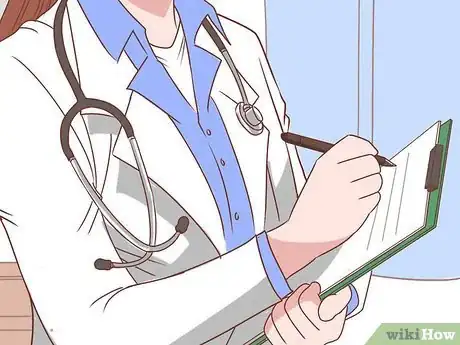
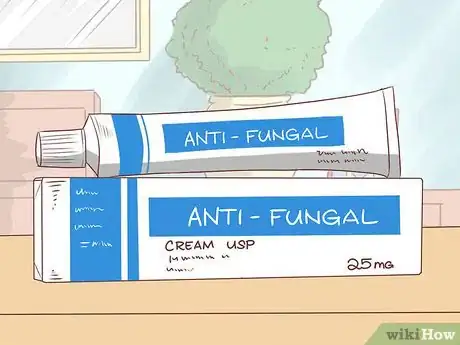
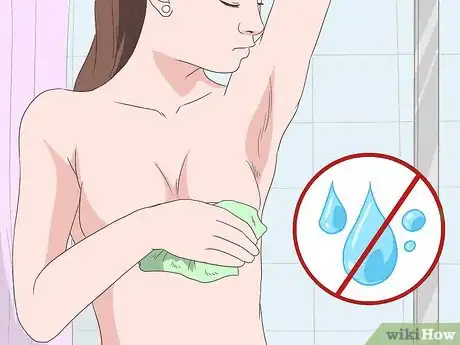
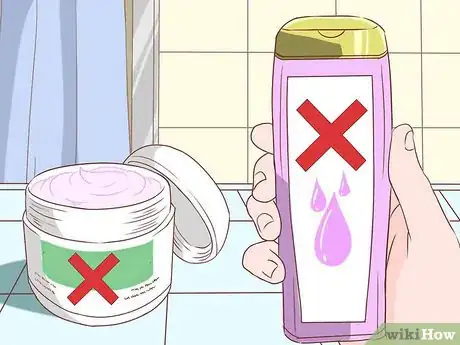
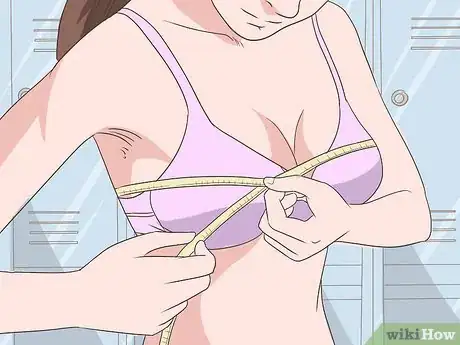


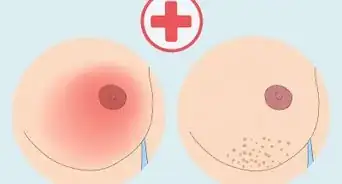
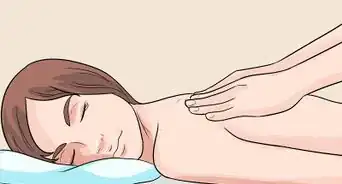
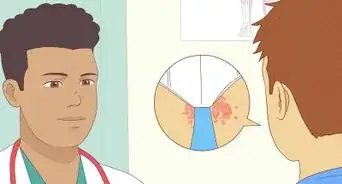
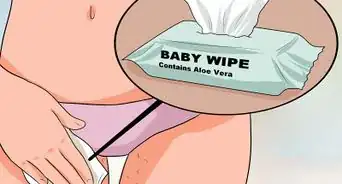

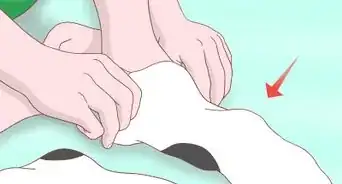
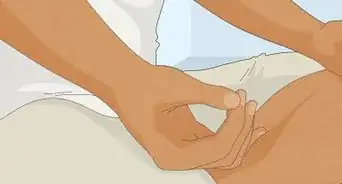
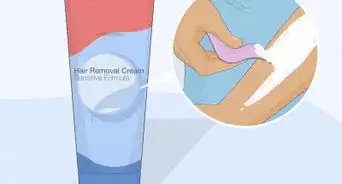
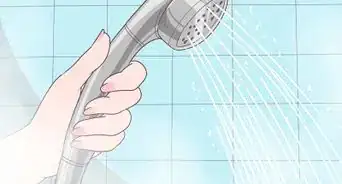

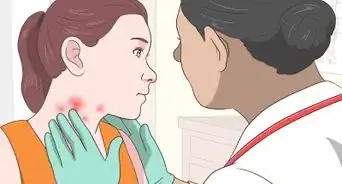
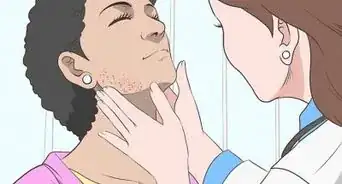
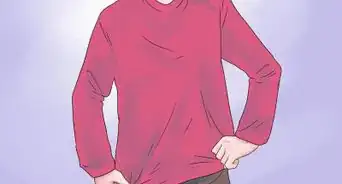










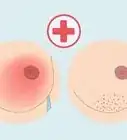
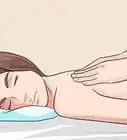





































Medical Disclaimer
The content of this article is not intended to be a substitute for professional medical advice, examination, diagnosis, or treatment. You should always contact your doctor or other qualified healthcare professional before starting, changing, or stopping any kind of health treatment.
Read More...